-
 Art of Wellness Acupuncture & Traditional Chinese Medicine (TCM)11704 Wilshire Blvd, Suite 295, Los Angeles, CA, 90025
Art of Wellness Acupuncture & Traditional Chinese Medicine (TCM)11704 Wilshire Blvd, Suite 295, Los Angeles, CA, 90025
myartofwellness@gmail.com310-451-5522 Office Hours
MonClosedTue7:30 am --4 pmWed7:30 am --4 pmThu7:30 am -- 4 pmFri7:30 am -- 4 pmSat7:30 am -- 4 pmSunClosedOur office opens from Tuesdays to Saturdays 7:30 am to 4 pm, will be closed on Memorial day, Independent day, Labor day, Thanksgiving day, Christmas and New year.
-
Recent Posts
- How to Treat De Quervain’s Tenosynovitis With Acupuncture and TCM
- Chinese New Year 2026: Year of the Horse
- Acupuncture and TCM Treatment for Perimenopause Symptoms
- How to Treat Insulin Resistance With Acupuncture and TCM
- How to Treat Metabolic Syndrome With Acupuncture and TCM
- How to Treat Syncope With Acupuncture and TCM
- How to Treat Thoracic Outlet Syndrome With Acupuncture and TCM
- How to Treat Dupuytren’s Contracture With Acupuncture and TCM
- How to Treat Nutcracker Syndrome With Acupuncture and TCM
- How to Treat Rosacea With Acupuncture and TCM
- How to Treat Perioral Dermatitis With Acupuncture and TCM
- Lymphatic Drainage With Acupuncture and TCM
- How to Treat Turf Toe With Acupuncture
- How to Treat Nerve Pain With Acupuncture and TCM
- How to Treat Watery Eyes With Acupuncture and TCM
- How to Treat Ovarian Cysts With Acupuncture and TCM
- Sign up to receive news and updates and get my free report:“The Top 10 Reasons to Try Acupuncture”

December 2025 M T W T F S S 1 2 3 4 5 6 7 8 9 10 11 12 13 14 15 16 17 18 19 20 21 22 23 24 25 26 27 28 29 30 31
Allergies
How to Treat Eczema With Acupuncture and TCM
By Qineng Tan, L.Ac., Ph.D. and Xiaomei Cai, L.Ac., Ph.D.

Itchy skin, dry skin? A bumpy skin rash that is raw from scratching it? Eczema, sometimes known as atopic eczema or atopic dermatitis, is a very common inflammatory skin condition. Acupuncture and TCM can help relieve itchy, scaly skin caused by eczema and skin allergy.
Eczema is a chronic inflammatory condition that flares up when triggered and becomes an allergic reaction rash. An eczema rash can look red and bumpy, or feel warm or hot to the touch. It can also show up as dry patches of skin that are rough and leathery, and can be brown or gray in color.
Scaly skin or eczema skin rashes that itch can appear anywhere on the body, but most commonly occur on the face, back of the neck, elbows, forearms, or backs of the knees.
Clusters of small, itchy fluid-filled blisters on the hands, fingers, or soles of the feet are known as dyshidrotic eczema, or dyshidrosis. This type of eczema can happen once, as an isolated incident, or become a chronic problem that keeps coming back.
What Causes Eczema?
Eczema is a widespread condition that often shows up in early childhood. About 80% of people who have atopic dermatitis show signs of skin rashes by the time they are six years old. It is estimated that about 1 in 10 people have some form of eczema.
The exact cause of eczema is not known, but it is generally believed to be a combination of factors, including: genetics, overactive immune function, and irritants in the environment.
Eczema is not contagious, but a person is more likely to experience allergic skin rash if allergies tend to run in their family. People who have hay fever, asthma, or are allergic to pet dander, pollen, or dust mites are more likely to have skin allergies like eczema, too, and possibly to pass these conditions on to their children.
Top 20 Eczema Triggers
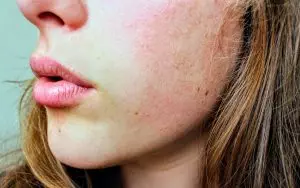
Eczema rashes tend to flare up when triggered by exposure to some allergen or element in the environment, or even a stressful situation. Common triggers for eczema breakouts include:
- Pet hair or dander
- Pollen
- Mold
- Dust or dust mites
- Insect bites
- Wool
- Synthetic fabrics like polyester or latex
- Metals, like copper, nickel, or gold
- Cigarette smoke
- Detergents or soaps
- Cleaning products
- Dyes
- Perfumes
- Chemicals in cosmetics or skin care products
- Frequent hand-washing
- Too-hot or too-frequent showers or baths
- Sweating
- Cold, dry places
- Humidity
- Emotional stress, work stress, or pressure at school
6 Types of Eczema
Eczema can present itself in different forms, with different types of skin conditions. The most common kinds of eczema include:
-
Atopic eczema or atopic dermatitis – dry, red, itchy, and/or bumpy skin
-
Contact eczema – caused by touching some irritant
-
Dyshidrotic eczema – marked by small, itchy blisters
-
Hand eczema– dry, peeling skin on the hands due to exposure to irritants or wetness
-
Neurodermatitis – thick, leathery, itchy patches of skin
-
Nummular eczema or discoid eczema – round lesions on the limbs or torso
The itchiness caused by eczema rashes is called pruritus, and it can be very intense, even disturbing a person’s sleep. Scratching the affected skin can damage it further, though, and lead to infections, so it is very important to find an effective treatment for the itching.
Eczema Cream and Eczema Treatment

Topical eczema cream is the most common treatment for atopic eczema. Topical corticosteroids are immunosuppressants in a cream form that help reduce inflammation and heal the itchy rash of an eczema flare up. However, when these topical steroid creams are used for long periods of time, they can make the skin thinner and more susceptible to bruising. Blood vessels may become more prominent (spider veins). Steroids inhibit the natural immune function of the skin, so a person may be more prone to skin infections.
Oral immunosuppressants like cyclosporine or systemic steroids may also be prescribed to treat eczema, but these, too, can only be used safely on a temporary basis, to help reduce the itchiness of a flare-up. Taking these medications for an extended period of time can have serious side effects, and they do not really address the root cause of eczema.
Acupuncture and TCM can be used as an alternative or adjunct eczema treatment, which can not only help relieve itching and help heal sores, but can help prevent flare-ups from returning.
Can Acupuncture Help Eczema?
The TCM theory of the Five Elements informs the way that we diagnose and treat each individual case of eczema. The root causes of eczema, or any skin rash, lie beneath the surface of the skin.
In TCM, Heat, Wind, Dryness, and Dampness are considered pathogenic forces that can take hold in the internal organs and then affect the way that skin cells develop. Examples of TCM diagnostic patterns of eczema or atopic dermatitis include:
- Brimming heat of heart and spleen
- Heart and spleen deficiency
- Spleen deficiency and dampness retention
- Wind and dryness due to blood deficiency
Each person’s experience with eczema is different because of the particular environmental or emotional triggers involved in the outbreak. By closely observing the color, temperature, and overall nature of the skin rash or scaly, thickened skin, the acupuncturist will get clues as to which internal systems are affected. By asking detailed questions about the patient’s lifestyle, the TCM practitioner is able to make recommendations that will help prevent further flare-ups.
Acupuncture treatment for eczema has been shown to help relieve itching better than antihistamines, and can also help to reduce skin inflammation.
Chinese herbal supplements designed to help relieve itchy skin have been shown to help relieve pruritus and reduce swelling. These studies suggest that herbs may be just as effective as topical steroids, but without the negative side effects.
The integration of Western medical methods and TCM treatment for eczema can be more beneficial than pharmacological treatment alone. Short-term use of topical corticosteroid eczema cream to help reduce inflammation and itching can be paired with acupuncture and herbs to help prevent flare-ups from recurring.
Acupuncture for Eczema Near Me in West Los Angeles
We want you to feel comfortable in your skin. At Art of Wellness, our comprehensive training in Western medicine, TCM, herbal medicine, and nutrition allows us to create a highly personalized treatment protocol for each patient. Many of our patients can attest that getting acupuncture and taking herbs have helped them reveal clearer, brighter skin and find relief from the pain of rashes and blemishes. If you or someone you love is suffering with itchy skin or allergic reactions, please consider trying TCM treatment for eczema and skin allergy.
*This article is for education from the perspective of Traditional Chinese Medicine only. The education provided by this article is not approved by FDA to diagnose, prevent, treat and cure human diseases. It should not stop you from consulting with your physician for your medical conditions. Traditional Chinese Medicine is based on Qi, which is an invisible force that usually cannot be observed by modern science. Because science focuses on testing ideas about the natural world with evidence obtained through observation, these aspects of acupuncture can’t be studied by science. Therefore acupuncture and Chinese herbs are often not supported by double-blind, randomized trials, and they are considered alternative medicine therapies in the United States.
How to Treat Diarrhea With Acupuncture and TCM
By Qineng Tan, L.Ac., Ph.D. & Xiaomei Cai, L.Ac., Ph.D.
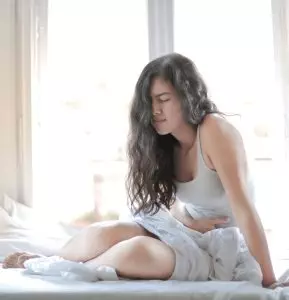
Chronic diarrhea, explosive diarrhea, diarrhea after eating? Diarrhea may be related to IBS (irritable bowel syndrome), or an IBD (inflammatory bowel disease), or a reaction to a food allergy, parasites, or stress. Acupuncture and TCM offer an alternative diarrhea treatment, so you can get relief from stomach pain and diarrhea.
Why Do I Have Diarrhea?
There can be many different causes of diarrhea, also known as loose stool. Acute diarrhea, which only lasts one or two days, will usually go away on its own.
Watery diarrhea that lasts a few days is usually due to food poisoning. Eating something that was rotten, or not cooked properly to destroy bacteria, can cause vomiting and diarrhea. Watery diarrhea can also happen when you have some type of viral infection, such as the “stomach flu.”
Chronic diarrhea, or persistent diarrhea, which lasts for weeks, or bouts of diarrhea that come and go frequently, may be related to IBS symptoms, IBD symptoms, Celiac disease, SIBO, or some other problem.
More than 6% of adults in the U.S. report having chronic diarrhea. Chronic diarrhea in children is also a serious health concern worldwide.
Top 10 Causes of Diarrhea
Diarrhea is a common condition that everyone experiences sometimes. Usually it is temporary, but it can become persistent and serious enough to require diarrhea treatment. The most common reasons a person experiences loose bowel movements include:
- Bacterial infection, traveler’s diarrhea, food poisoning, unsafe drinking water
- Viral infection, such as rotavirus, viral gastroenteritis, stomach flu
- Parasite infection, such as giardiasis
- Food allergy, food intolerance, food sensitivity, Celiac disease
- Reaction to medications like antibiotics, antidepressants, or Metformin
- Reaction to radiation therapy, cancer treatment
- IBS – diarrhea, constipation, and stomach cramps are common IBS symptoms
- IBD – colitis or Crohn’s disease, inflammatory autoimmune disorders that affect the gut
- Malabsorption of food, poor absorption of nutrients
- Menstrual cycle or Perimenopause – changes in hormones/estrogen can cause diarrhea
Certain foods can cause diarrhea, including: too much coffee, artificial sweeteners like mannitol and sorbitol, and red food coloring. Magnesium supplements can also cause loose stools.
If diarrhea lasts more than a few days, it is important to seek healthcare advice. Chronic diarrhea can lead to dehydration and fatigue, and may be happening because of some more serious condition that needs to be addressed.
What Causes Chronic Diarrhea?
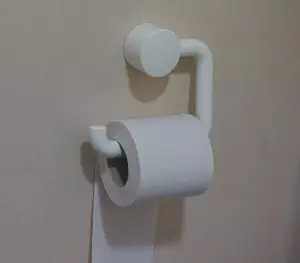
Bouts of diarrhea that keep recurring can be a symptom of disorders such as:
- IBD (inflammatory bowel disease) – the most common IBDs are ulcerative colitis and Crohn’s disease. IBD symptoms usually include bloody diarrhea and abdominal pain. IBDs can cause chronic or recurring diarrhea, which can lead to dehydration, fatigue, and weight loss. IBDs can be mild, or so serious that they cause long-lasting damage to the gastrointestinal tract.
- Ulcerative colitis – an autoimmune disorder that causes inflammation and ulcers, or open sores, in the lower gastrointestinal system, including the colon and rectum.
- Crohn’s disease – an autoimmune disorder that causes inflammation mainly in the small intestine, but can affect any part of the GI tract.
- IBS – Irritable bowel syndrome can seem similar to IBDs, also causing recurring bouts of diarrhea and stomach pain. However, IBS is considered a functional gastrointestinal disorder. It is quite common. People with IBS symptoms may have alternating bouts of diarrhea and constipation. People who tend to have more diarrhea-dominant IBS have “IBS-D.”
- Celiac disease – an autoimmune disorder in which a reaction to eating wheat gluten causes serious inflammation of the GI system, leading to abdominal pain, bloated stomach, diarrhea, malnutrition, fatigue, and skin rashes.
With these conditions, diarrhea is brought on periodically—sometimes alternating with constipation, as in some cases of IBS—by factors having to do with the diet or stress, or with autoimmune processes.
Some surgeries that affect the gastrointestinal organs—like gastric bypass, gastric sleeve, or gallbladder removal—can cause chronic diarrhea.
Chronic diarrhea can be caused by an inability of the intestinal walls to absorb nutrients, and/or of the walls of the colon to absorb liquid. It may also be due to excessive action of the intestine in terms of peristalsis, the squeezing of the intestine to move matter through.
Diarrhea Treatment
Acute diarrhea usually goes away on its own in a day or two. Often, people will use OTC remedies for diarrhea and stomach pain, such as Immodium or Pepto-Bismol.
If you have been experiencing persistent diarrhea and seek medical advice, a doctor will perform tests to figure out what is causing the diarrhea, and will offer electrolyte fluids to help with dehydration. Blood tests or a stool test will show if the diarrhea is due to a bacterial infection or parasitic infection.
If chronic diarrhea is determined to be related to a medication you are already taking, then that may need to be adjusted.
Discovery of IBS or an IBD usually involves more diagnostic testing, including a colonoscopy and/or endoscopy, to see if there is inflammation or blockage in the GI tract.
Medical treatment for IBS may involve being offered antispasmodic medications that relax the intestinal walls and slow down the movement of the bowels and can help relieve stomach cramps and abdominal cramping. Dietary changes and behavioral therapy may be recommended.
Pharmacological treatment for IBDs like colitis and Crohn’s usually involves taking a combination of anti-inflammatories and immunosuppressants, to reduce inflammation in the gut and to block the inappropriate autoimmune responses that are triggering the inflammation. Unfortunately, steroids and medications like Xeljanz can cause other side effects and health problems.
Medical treatment for chronic diarrhea may help relieve symptoms and reduce the frequency of bouts of diarrhea, but it does not necessarily address the underlying causes of diarrhea.
Acupuncture and TCM offer an effective alternative treatment for diarrhea that is more suited to each patient’s individual situation.
Can Acupuncture Help Diarrhea?
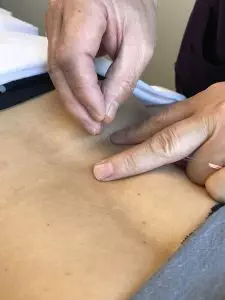
Chronic diarrhea, according to TCM theory, is usually considered to be related to the health of the spleen. In TCM, the organ systems all interact harmoniously, unless there is imbalance. The imbalance of one organ system may throw off other systems, leading to various symptoms.
In TCM, the spleen is responsible for breaking down the nutrients from food and converting them into energy. If the spleen is not functioning properly, watery stool is often the result. Diarrhea, stomach pain, and other symptoms may differ from person to person, depending on how the spleen is interacting with the liver, stomach, or kidneys.
Common Chinese Medicine diagnosis patterns for chronic diarrhea include:
- Spleen Deficiency with Liver Qi stagnation: mucus in the stool, abdominal pain, cramping, gassiness, bloated stomach, irritability, and feelings of depression
- Spleen Deficiency with Stomach deficiency: watery stools, poor appetite, feeling full quickly, stomach distended after eating, pallor, and fatigue
- Spleen Deficiency with Kidney Deficiency: diarrhea in the morning, partially digested food in the stool, abdominal pain, lower back pain, knee pain, feeling cold
Acupuncture treatment for diarrhea, which may include moxibustion and herbs, aims to support the health of the spleen and other organs. Acupuncture has been shown to help relieve diarrhea and constipation related to IBS. Acupuncture treatment can also help with reducing stress and anxiety, which are common triggers for IBS symptoms.
Acupuncture can also help with diarrhea due to IBDs like ulcerative colitis and Crohn’s disease by reducing inflammation and helping to balance immune responses. TCM treatment for Crohn’s disease or colitis, incorporating nutrition and herbal supplements, can help improve the gut biome and strengthen the lining of the intestinal walls.
Acupuncture for Diarrhea Near Me, Los Angeles, West L.A., and Santa Monica
TCM treatment with an experienced acupuncturist near me can be very beneficial for anyone dealing with ongoing gastrointestinal distress. Both adults and children can find relief from diarrhea, constipation, stomach cramps, bloating, and abdominal pain related to conditions like IBS, IBDs, or celiac disease through acupuncture and herbs. At Art of Wellness, we have over 30 years of experience helping people with gastric disorders of all kinds.
*This article is for education from the perspective of Traditional Chinese Medicine only. The education provided by this article is not approved by FDA to diagnose, prevent, treat and cure human diseases. It should not stop you from consulting with your physician for your medical conditions. Traditional Chinese Medicine is based on Qi, which is an invisible force that usually cannot be observed by modern science. Because science focuses on testing ideas about the natural world with evidence obtained through observation, these aspects of acupuncture can’t be studied by science. Therefore acupuncture and Chinese herbs are often not supported by double-blind, randomized trials, and they are considered alternative medicine therapies in the United States.
How to Treat Dermatitis With Acupuncture and TCM
By Xiaomei Cai, L.Ac., Ph.D. & Qineng Tan, L.Ac., Ph.D.
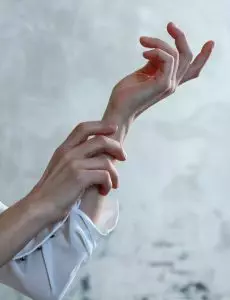
Itchy skin, dry skin irritation, or skin rash? Dermatitis is a broad term that covers many skin problems, including eczema, heat rash, diaper rash, and other kinds of skin allergy. Acupuncture and TCM offer a way to treat dermatitis, eczema, and itchy skin conditions.
The medical term “dermatitis” can refer to many types of skin irritation that involve inflammation. Inflamed skin can cause itching, redness, dryness, and rashes. A dermatitis itchy skin rash is caused by an inflammatory response related to the immune system.
Eczema, also known as atopic dermatitis, is a common inflammatory skin condition; over 30 million people in the U.S. have some type of eczema. Eczema can show up as early as a few weeks after birth in some babies, or during childhood, or during adulthood.
While what exactly causes atopic dermatitis to occur in some people is not completely understood, it is generally accepted that it is a combination of genetic, immunological, and environmental factors.
Dermatitis is not contagious; it is not passed from person to person. However, you are more likely to be susceptible to dermatitis or eczema if other people in your family have it, or if there is a family history of allergies and asthma.
Eczema and other forms of dermatitis tend to “flare up” when a person is exposed to some sort of trigger and has an allergic reaction. This could be due to something in the environment, or some product or plant that touched the person’s skin. It can also be due to internal causes, like an autoimmune problem, excess heat in the body, or emotional stress.
Signs of Dermatitis:
- Itchy dry skin rash skin irritations (pruritus)
- Red rash, red bumps on skin
- Rash like a burn
- Blisters
- Thick skin, hard skin, swelling
- Scaly skin, creasing skin
- Crusty sores, painful skin sores
- Bleeding rash, oozing skin rash
- Flaking skin (dandruff)
Symptoms of dermatitis can come and go. Scratching at itchy patches or blisters associated with dermatitis can cause a skin infection, so it is important to manage and control this condition.
Acupuncture and TCM herbs can help relieve itchy skin and inflammation, while also helping to balance the immune system to prevent further eczema flare ups.
Top 10 Types of Dermatitis
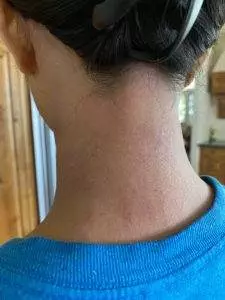
Many different conditions can cause dermatitis—meaning, inflammation of the skin. Different kinds of dermatitis include:
- Atopic dermatitis – also known as eczema, marked by dry, itchy, red patches of skin.
- Contact dermatitis – this is when a skin rash breaks out due to exposure to some kind of external irritant, such as a cosmetic product, piece of jewelry, or plant like poison ivy.
- Seborrheic dermatitis – flaking skin, also known as dandruff, occurs mostly on oily areas of the skin.
- Dyshidrotic dermatitis – (also called dyshidrotic eczema or pompholyx) small, itchy, fluid-filled blisters that appear on the soles of the feet or palms of the hands, or the tips of the fingers or toes. The blisters may break out due to exposure to an allergen or when hands and feet are often wet or sweaty.
- Diaper rash – a red rash that forms on a baby’s bottom or perineal area due to contact with the diaper and frequent wetness.
- Neurodermatitis – (also called lichen simplex chronicus) is a type of eczema marked by one or two very itchy, scaly patches that can become thickened and leathery – most often affects an area on the neck, ankle, arm, or groin. Neurodermatitis can itch so intensely that it affects a person’s sleep, and can be triggered by stressful events.
- Nummular dermatitis – (also known as discoid eczema) is marked by round, coin-shaped lesions that appear on the limbs or torso. These lesions can become infected with scratching, and may be related to poor circulation.
- Perioral dermatitis or Periorificial dermatitis – pink scaly patches or pustules that form around the mouth. This occurs more commonly in young women. Some doctors believe it may be related to candida, and/or influenced by hormones.
- Stasis dermatitis – (also called venous stasis dermatitis) itchy, scaly, discolored skin around the lower legs and ankles, due to poor circulation and blood pooling in the lower extremities.
- Dermatitis herpetiformis – a bumpy, blistered skin rash (looks similar to a herpes outbreak, but is not actually related to herpes simplex) that is related to celiac disease, triggered by ingesting gluten or wheat.
Psoriasis can look similar to eczema, but it is a separate condition that can coexist with various types of dermatitis. Rosacea redness can also look similar to dermatitis, but is a distinctly different condition that can occur at the same time as dermatitis.
What Causes Dermatitis?
A combination of the immune system reacting to irritants in the environment, and genetic predisposition.
Common environmental factors that can contribute to dermatitis include:
- Chemicals
- Air pollutants
- Fluoride in water or toothpaste
- Fragrances, perfumes, air freshener
- Fragrances in skin products, cosmetics, lotions, soaps
- Tobacco smoke
Other conditions that may occur simultaneously with dermatitis include: depression, anxiety, insomnia, allergies, and asthma.
Eczema Treatment
There are many different types of medical treatment for dermatitis. Some are topical—meaning, applied to the skin. Others are taken in an oral pill form, or injected into the skin.
Topical corticosteroid creams, which can help reduce skin inflammation, are the most common treatment for eczema and dermatitis. These can help reduce itching and swelling. However, prolonged use of topical steroids can cause side effects like thin skin, spider veins, and acne. Steroids can affect growth in children, and can cause eye problems like glaucoma or cataracts in older people.
Steroids that are taken orally, like Prednisone, can help control systemic inflammation for a time, while patches of scaly skin heal. However, there are many serious side effects associated with taking steroids for a long time, and it is also possible to experience a “rebound effect.” This means that the dermatitis symptoms come back even stronger when a person stops taking the steroid medications.
Calineuron inhibitors and JAK inhibitors are designed to stop certain chemical processes in the body related to immune responses. They can help block immune system reactions to calm the dermatitis skin problems.
There are many new types of treatment for eczema being developed. Phototherapy, or light therapy, using ultraviolet (UV) light, may be tried when topical treatments are not working for eczema that is widespread over the whole body. However, this kind of therapy can cause prematurely aging skin, changing skin pigmentation, and potentially increase the risk of skin cancer.
Acupuncture and TCM herbal supplements offer a way to treat eczema without any damaging side effects.
Can Acupuncture Help Dermatitis and Eczema?
One of the core concepts of TCM is the 5 Elements Theory, according to which organs of the body correspond with seasons and weather conditions. According to this theory, eczema and other kinds of dermatitis arise due to imbalances within the internal organ systems affected by external conditions, such as Wind and Heat.
The lungs, especially, are connected to the skin in the TCM system. The lungs can be affected by excess heat or stagnation in the liver. Thus, an itchy red rash on the skin is actually an expression of a deeper, more complex internal condition. Therefore, it is necessary to treat dermatitis and eczema not only with topical creams, but to use acupuncture and herbs to balance all of the organ systems.
The acupuncturist gets clues about which internal organs are out of harmony by observing the eczema symptoms: the type of rash or scaly skin, the color and temperature. Each individual case of dermatitis is unique, triggered by different irritants, and arising from a person’s overall state of health.
One study showed that acupuncture treatment worked better than antihistamines for helping to reduce the itchiness of atopic dermatitis pruritus. Acupuncture also helps to reduce inflammation and overall stress.
Studies done in China to determine the efficacy of an herbal formulation developed for eczema showed that it worked well to reduce itching and recurrence of rash.
As systematic review of over 350 studies on acupuncture for eczema showed the patients who were given acupuncture treatment instead of conventional treatment experienced better overall symptom reduction and quality of life.
Top 5 Tips to Prevent Dermatitis Itchy Skin

There are things you can do to help prevent eczema flare-ups from occurring and avoid recurrent rashes.
- Do not bathe in very hot water.
- Keep showers short and warm, and use gentle cleansers, without strong chemical perfumes.
- Do not scrub your skin during or after the shower, while drying. Pat gently.
- Use moisturizer frequently to maintain a protective layer on your skin.
- Wear long pants and sleeves when hiking and adventuring. Wear gloves when gardening.
Acupuncture Near Me for Dermatitis in Los Angeles and Santa Monica
Acupuncture can help relieve itching, aid in the healing of lesions, help stimulate healthier immune responses, and reduce stress. TCM treatment can also be sought as a safe treatment for children with eczema, or during pregnancy, as it is free of negative side effects.
TCM can also help patients with other skin conditions, including signs of aging, acne, hives (urticaria), rosacea, vitiligo, and psoriasis.
*This article is for education from the perspective of Traditional Chinese Medicine only. The education provided by this article is not approved by FDA to diagnose, prevent, treat and cure human diseases. It should not stop you from consulting with your physician for your medical conditions. Traditional Chinese Medicine is based on Qi, which is an invisible force that usually cannot be observed by modern science. Because science focuses on testing ideas about the natural world with evidence obtained through observation, these aspects of acupuncture can’t be studied by science. Therefore acupuncture and Chinese herbs are often not supported by double-blind, randomized trials, and they are considered alternative medicine therapies in the United States.
How to Treat Colic and Infant Reflux With Acupuncture and TCM
By Xiaomei Cai, L.Ac., Ph.D. & Qineng Tan, L.Ac., Ph.D.

Colic and infant reflux are conditions that can cause excessive crying in babies and a lot of worry for new parents. Newborn reflux is when a baby spits up a lot, which is sometimes treated as GERD in infants. Infant reflux, also called baby reflux, and colicky pain can both be soothed with acupuncture and TCM treatment for babies.
Colic or Baby Reflux Can Be Treated With Chinese Medicine and Acupuncture
What is colic? Infantile colic is a well-known yet little understood syndrome, with crying being the primary symptom. Signs of colic include fussiness and crying inconsolably for hours. The crying, which can be more like screaming, often occurs at about the same time every day, usually in the later afternoon or evening. A colicky baby may also have a red face and display motor behaviors like clenched fists and drawing their legs up to their tummy.
What causes colic is not known, but it is sometimes attributed to gassiness and the movement of the undeveloped digestive system, which the colic newborn experiences with intense discomfort. It has been suggested that it may be related to food allergies in some infants, or to gut health. Some people also link colic to birth trauma. Babies with colic may have sensitivities related to the nervous system and have more trouble adapting to their environment, both externally and internally.
Colic is fairly common, affecting about 10-35% of infants. Most babies outgrow colicky abdominal pain within a matter of months. Those few months can be very stressful for the whole family, though. Colic is considered to be a factor in some mothers developing postpartum depression, so finding colic remedies is important for everyone’s mental health.
The symptoms of colic can sometimes look similar to those of infant reflux. Baby reflux also leads to fussy crying, wiggling and arching the body, and having trouble settling down to sleep.
Infant reflux refers specifically to a baby spitting up undigested milk from the stomach. This is also called GER (gastroesophageal reflux) and is actually a normal thing that happens with most babies.
Reflux happens because there is not a firm seal created by the esophageal sphincter muscle, which is still developing in a young infant. Sometimes premature infants are especially susceptible to having infant reflux.
Babies’ stomachs are designed to take in just a little bit of milk at a time. If the baby is getting too much milk, or swallowing air, it can cause leaking from the stomach up into the esophagus, especially when lying down.

Sometimes just working out the right feeding schedule, burping, and sleeping positions helps. In other cases, nothing seems to help. If spitting up or vomiting is interfering with the baby getting enough nutrients, then failure to thrive can become a real concern.
Acid reflux in newborns that is on the level of a disorder is rare (less than 1%). Sometimes, though, a baby may actually have GERD, where the spitting up happens very frequently and is causing the baby to feel sensations that we think of as “heartburn.” This can also lead to respiratory problems like coughing or choking due to breathing in the stomach acids.
You might find it hard to imagine acupuncture treatment being used for a tiny baby, but infants respond very positively to treatment. Sometimes auricular acupuncture (acupuncture on ear), where seeds are used instead of needles, is an option. Acupuncture can help baby reflux and colic on many levels: relieving pain, reducing bloating and inflammation in the digestive tract, while calming anxiety and restlessness and improving sleep.
Top 10 Signs of Infant Reflux
Newborn reflux symptoms can look similar to the symptoms of colic, but if there is frequent regurgitation of milk, or respiratory symptoms like coughing and wheezing, that may indicate baby reflux as opposed to colicky symptoms. Symptoms of infant reflux include:
- Frequent spitting up or vomiting
- Fussiness, irritability
- Crying a lot, screaming inconsolably
- Arching back, tensing the body, wiggling
- Hiccups
- Coughing or wheezing while feeding
- Excessive drooling
- Poor sleep
- Doesn’t want to feed
- Spit up is green or bright yellow
New parents may be easily overwhelmed when it appears that their baby is in pain and isn’t digesting their food properly. If dietary changes and adjustments to the feeding schedule aren’t helping, then parents may seek medical advice.
Treatment for Infant Reflux

Generally, if your doctor just sees colicky symptoms, there is not a whole lot they can do other than offer suggestions for changing the dietary routine and making your baby as comfortable as possible.
In recent years, it seems that doctors are more and more likely to make a diagnosis of infant reflux when a baby is spitting up and crying, and to recommend medication as a treatment.
In the last few decades, GERD medications for reducing stomach acids, known as PPIs, (proton pump inhibitors), like Prilosec and Prevacid, have been deemed safe for adults and infants. However, evidence has also pointed to various problems and side effects with using these medications for more than a short period of time.
Changing the production of stomach acids in a young baby can affect how they are absorbing nutrients, like calcium and Vitamin B12. Use of PPIs has also been observed to cause kidney problems and affect bone density in adults. Less stomach acid can lead to more bacteria and more respiratory infections.
The majority of babies who experience infant reflux and/or colic will get over it naturally, usually within a few months. Anything that can be done to help understand the child’s constitution and promote good health during this time should certainly be considered. However, many people will not feel that resorting to medications is the best or only option.
Acupuncture and TCM offer a way to help acid reflux in babies and adults, without side effects. TCM treatment can help strengthen an infant’s digestive system, nervous system, and immune system, all at the same time.
Can Acupuncture Help Infant Reflux and Colic?
An acupuncturist will look carefully at the baby for symptoms of reflux and colic so as to differentiate, according to TCM principles, where there is an imbalance. For example, if a baby is crying, has a red face, and is feverish, we might see the pattern of “hot colic,” which happens when there is too much warmth in the stomach Qi. Babies with “cold colic” may be more listless and have chilly hands and feet. When treating Colic and infant reflux, the TCM practitioner will work on balancing and regulating the stomach Qi and clearing stagnation.

Many acupuncture points can be stimulated in order to help make the baby more comfortable and calm. The Yin Tang point can be helpful for reducing restlessness. Shen Men is the classic point to regulate the nervous system and help banish anxiety. Stomach points can help to reduce nausea and help stimulate the appetite.
Case studies have shown that small infants who are vomiting or spitting up can respond to acupuncture quickly, even after just one treatment. A larger study showed that acupuncture was effective at relieving colicky symptoms, shortening the duration of episodes of fussy crying.
Studies with adults have shown that acupuncture and herbs are more effective for long term reduction of acid reflux than PPIs. Acupuncture treatment can also help strengthen the lower esophageal sphincter (LES).
In many cases, new parents need individualized support for making feeding and dietary changes. A qualified acupuncture provider is also highly trained in nutrition and can help determine if there are certain foods that need to be eliminated from the nursing parent’s diet or from the formula of choice. Finding positions and practices that help the baby relax before and during feeding, burp appropriately, and be settled to sleep when a feeding has come to a satisfactory close can be life-changing. These will be easier to implement when acupuncture treatment has helped even out the infant’s nervous system and soothed the stomach.
Acupuncture Near Me for Infant Reflux and Colic in Los Angeles
Parenting is a hard job, especially when the baby is not eating or sleeping well. TCM treatment can help with all kinds of postpartum issues for both mother and child, including problems with breastfeeding, postpartum depression, an infant’s weight loss or failure to thrive, as well as colic and infant reflux. Please, if your baby is crying and seems to be in pain, or is having trouble feeding, do not hesitate to call us at Art of Wellness. Drs. Cai and Tan have over 30 years of experience treating mothers and children with gentle acupuncture, herbs, and good advice.
*This article is for education from the perspective of Traditional Chinese Medicine only. The education provided by this article is not approved by FDA to diagnose, prevent, treat and cure human diseases. It should not stop you from consulting with your physician for your medical conditions. Traditional Chinese Medicine is based on Qi, which is an invisible force that usually cannot be observed by modern science. Because science focuses on testing ideas about the natural world with evidence obtained through observation, these aspects of acupuncture can’t be studied by science. Therefore acupuncture and Chinese herbs are often not supported by double-blind, randomized trials, and they are considered alternative medicine therapies in the United States.
How to Treat a Sore Throat With Acupuncture and TCM
By Qineng Tan, L.Ac., Ph.D. & Xiaomei Cai, L.Ac., Ph.D.

Scratchy throat? Dry throat? Painful Swallowing? A sore throat is often the first sign of a cold, but it can be hard to tell if a swollen throat is caused by a throat infection, a virus, bacterial infections like strep throat, allergies, or something else. Acupuncture and TCM Chinese herbs can provide excellent sore throat remedies to bring quick pain relief.
Throat pain, throat irritation, or trouble swallowing due to soreness is known as “pharyngitis.” The most common sore throat causes are viral infections, or cold and flu. This type of sore throat will usually go away once the infection runs its course.
The bacterial infection known commonly as “strep throat,” caused by streptococcus bacteria (throat strep), is another common cause of sore throat, usually accompanied by fever, swollen tonsils and lymph nodes, and red spots in the mouth.
But there are many possible causes of a sore throat, including:
- Common Cold – along with a runny nose, sneezing, and cough, a sore throat is one of the common cold symptoms.
- Flu – a sore throat with fever and chills or body aches may be a sign of flu.
- COVID-19 virus – many people are experiencing a sore throat as one of the early symptoms of the latest variant. This scratchy throat can last a long time.
- Mononucleosis – the Epstein Barr virus, also known as “mono,” can cause a sore throat, swollen lymph nodes, fatigue, and sometimes a skin rash.
- Chickenpox or measles – these illnesses often start off with a mild fever and sore throat; then, the rash or skin sores appear a few days later.
- Allergies – an allergy to pollen or other particles in the air may cause dryness in the throat. Postnasal drip can also create more irritation from constant throat-clearing.
- Dryness – when the weather is very dry—as it is here in California, sometimes—a stuffy nose during the night can lead to sleeping with your mouth open. Breathing dry air through your mouth can cause you to wake up with a sore, scratchy throat.
- Vocal strain – shouting and screaming at a concert, or overusing your voice with talking or singing can lead to throat pain and the need for vocal rest.
- GERD – Acid reflux can damage the tissues of the throat, causing difficulty swallowing, a hoarse-sounding voice, and chronic pharyngitis.
- Sleep Apnea – snoring can cause a dry mouth and sore throat.
Sore Throat Treatment
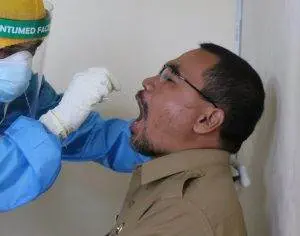
A doctor will typically perform a swab test or throat culture to check if a person has strep throat or a staph infection. If so, antibiotics are usually prescribed to treat the bacterial infection. But antibiotics will not help a sore throat that is due to a viral infection. Most people will take pain relievers or sore throat medicine to help relieve throat pain, or suck on throat lozenges.
People who suffer from burning chest pain and sore throat from GERD will often use over-the-counter antacid tablets to help with scratchy throat.
Most people just wait out a sore throat, hoping it will get better within a few days and not turn into chronic pharyngitis. Acupuncture and other TCM treatments can help reduce the time it takes to get over a sore throat and related illness.
Can Acupuncture Help a Sore Throat?
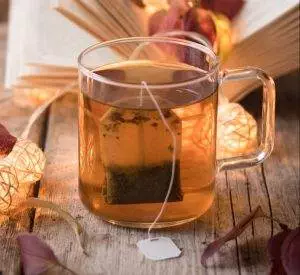
TCM methods have been used to treat upper respiratory infections, or the common cold, for thousands of years. According to TCM theory, “heat” is a pathogenic force that encompasses conditions of too much heat and dryness in the body. This excess heat can come from both external factors and internal factors. There may be a yin deficiency, meaning that there is not enough yin energy to cool down the body.
People are more prone to developing heat imbalances during the winter months because they tend to spend more time indoors with the heat on, eat more warm foods, and get less exercise. Too much heat builds up in the body, and this leads to inflammation, dryness, and sometimes itchy skin and rashes.
Acupuncture treatment can help reduce inflammation and provide analgesic pain relief of a sore throat. One study showed that people treated with auricular acupuncture for sore throat reported less pain, both 15 minutes after treatment, and six hours later. Acupuncture can also work to help clear heat from the organ systems of the body, clear phlegm from the lungs and upper respiratory tract, and to strengthen the Wei Qi, or defensive Qi.
Chinese herbs will also be instrumental in helping to clear up a sore throat. There are many varieties of herbal formulae that work in different synergistic ways to alleviate a sore throat, depending on the other related symptoms and whether or not there is some type of infection present. An acupuncture practitioner will be able to customize a formula for each individual patient, but there are many tried-and-true Chinese herb preparations that work well for colds and sore throats in many cases.
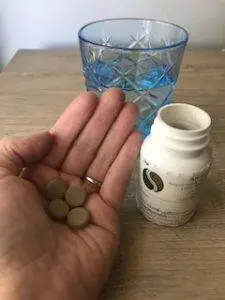
Yin-Qiao, an herbal formulation composed of several Chinese herbs, is a very popular remedy for the common cold and works very well to shorten the duration of a cold, especially if taken right at the first sign of a sore throat. Yin-Qiao has been shown to work on many levels, as an antiviral, anti-bacterial, and an anti-inflammatory, as well as helping to strengthen immunity.
A sore throat is a sign that you should rest your voice, get extra sleep, and consume plenty of liquids. We recommend sipping on warm water, on its own or with lemon or ginger, or an herbal tea such as mint. Eat more cooling foods, such as: apples, pears, especially Asian pears, radishes, cucumbers. These will help dispel heat.
Acupuncture for Sore Throat Near Me in West Los Angeles
While often a sore throat is simply a symptom of a mild cold, it is also a clear signal that there is some kind of infection or other imbalance present. It is wise to pay attention and do everything you can to boost your immune system as soon as you notice that scratchy throat sensation. An acupuncture treatment and herbs can go a long way towards helping make sure that a sore throat doesn’t turn into something more serious.
*This article is for education from the perspective of Traditional Chinese Medicine only. The education provided by this article is not approved by FDA to diagnose, prevent, treat and cure human diseases. It should not stop you from consulting with your physician for your medical conditions. Traditional Chinese Medicine is based on Qi, which is an invisible force that usually cannot be observed by modern science. Because science focuses on testing ideas about the natural world with evidence obtained through observation, these aspects of acupuncture can’t be studied by science. Therefore acupuncture and Chinese herbs are often not supported by double-blind, randomized trials, and they are considered alternative medicine therapies in the United States.